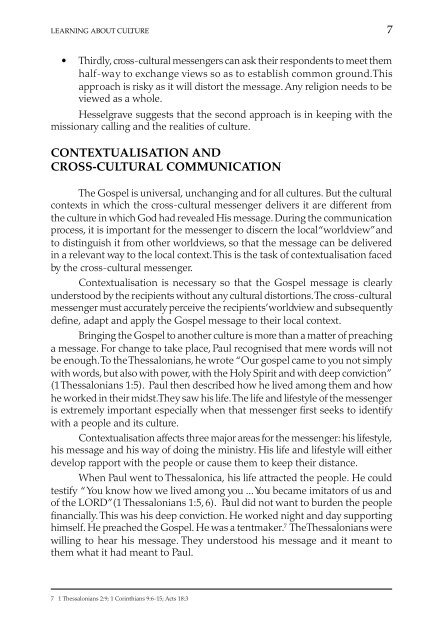WHEN YOU CROSS CULTURES - World Evangelical Alliance
WHEN YOU CROSS CULTURES - World Evangelical Alliance
WHEN YOU CROSS CULTURES - World Evangelical Alliance
You also want an ePaper? Increase the reach of your titles
YUMPU automatically turns print PDFs into web optimized ePapers that Google loves.
LEARNING ABOUT CULTURE<br />
• Thirdly, cross-cultural messengers can ask their respondents to meet them<br />
half-way to exchange views so as to establish common ground.This<br />
approach is risky as it will distort the message. Any religion needs to be<br />
viewed as a whole.<br />
Hesselgrave suggests that the second approach is in keeping with the<br />
missionary calling and the realities of culture.<br />
CONTEXTUALISATION AND<br />
<strong>CROSS</strong>-CULTURAL COMMUNICATION<br />
The Gospel is universal, unchanging and for all cultures. But the cultural<br />
contexts in which the cross-cultural messenger delivers it are different from<br />
the culture in which God had revealed His message. During the communication<br />
process, it is important for the messenger to discern the local “worldview” and<br />
to distinguish it from other worldviews, so that the message can be delivered<br />
in a relevant way to the local context. This is the task of contextualisation faced<br />
by the cross-cultural messenger.<br />
Contextualisation is necessary so that the Gospel message is clearly<br />
understood by the recipients without any cultural distortions. The cross-cultural<br />
messenger must accurately perceive the recipients’ worldview and subsequently<br />
define, adapt and apply the Gospel message to their local context.<br />
Bringing the Gospel to another culture is more than a matter of preaching<br />
a message. For change to take place, Paul recognised that mere words will not<br />
be enough. To the Thessalonians, he wrote “Our gospel came to you not simply<br />
with words, but also with power, with the Holy Spirit and with deep conviction”<br />
(1 Thessalonians 1:5). Paul then described how he lived among them and how<br />
he worked in their midst. They saw his life. The life and lifestyle of the messenger<br />
is extremely important especially when that messenger first seeks to identify<br />
with a people and its culture.<br />
Contextualisation affects three major areas for the messenger: his lifestyle,<br />
his message and his way of doing the ministry. His life and lifestyle will either<br />
develop rapport with the people or cause them to keep their distance.<br />
When Paul went to Thessalonica, his life attracted the people. He could<br />
testify “ You know how we lived among you ... You became imitators of us and<br />
of the LORD” (1 Thessalonians 1:5, 6). Paul did not want to burden the people<br />
financially. This was his deep conviction. He worked night and day supporting<br />
himself. He preached the Gospel. He was a tentmaker. 7 The Thessalonians were<br />
willing to hear his message. They understood his message and it meant to<br />
them what it had meant to Paul.<br />
7 1 Thessalonians 2:9; 1 Corinthians 9:6-15; Acts 18:3<br />
7

















